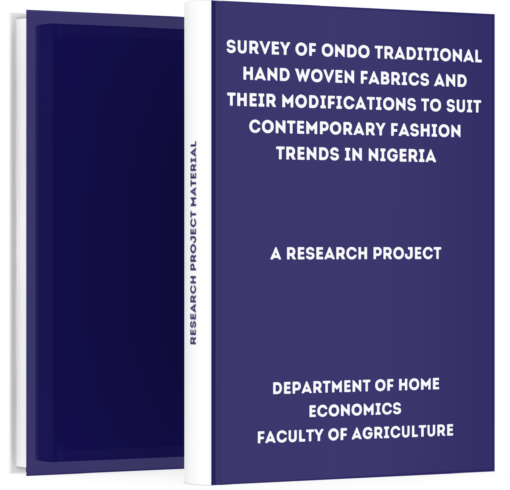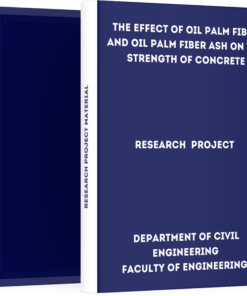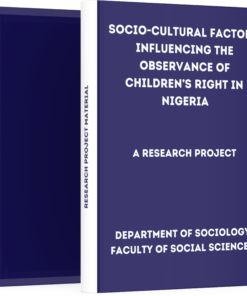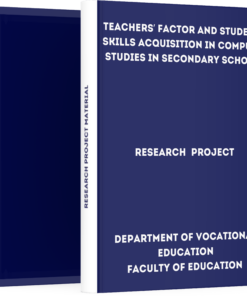Survey of Ondo Traditional Hand Woven Fabrics and their Modifications to Suit Contemporary Fashion Trends in Nigeria
₦3,000.00
If you are interested in getting this project material “Survey of Ondo Traditional Hand Woven Fabrics and their Modifications to Suit Contemporary Fashion Trends in Nigeria”, click on the DOWNLOAD BUTTON to make payment and the file will be delivered to your email immediately after confirmation.
Description
– Survey of Ondo Traditional Hand Woven Fabrics and their Modifications to Suit Contemporary Fashion Trends in Nigeria –
Download Survey of Ondo Traditional Hand Woven Fabrics and their Modifications to Suit Contemporary Fashion Trends in Nigeria. Students who are writing their projects can get this material to aid their research work.
Abstract
The study examined traditional weaving as a popular craft among many ethnic groups in Nigeria and also reviewed related literature on the subject matter.
It surveyed Ondo traditional hand woven fabrics and identifies alaari, sanmiyan, etu, ogungunelu and petuje as the major traditional ones used in Ondo.
The study is also aimed at modifying the Ondo traditional hand woven fabrics by adopting the traditional weaving techniques, with the view that, they could be adapted to suit fashion trends in contemporary Nigerian society.
The research designs adopted were the descriptive survey and scientific research strategies, while the study samples comprised thirty (30) traditional weavers, two hundred and fifty (250) Ondo traditional hand woven fabrics users and two hundred and fifty (250) potential users (youth) of the modified hand woven fabrics.
Well structured questionnaire and photographs were the two instruments used for data collection. Data collected were subjected to analysis by using Statistical Package for Social Sciences (SPSS).
The descriptive statistics, of percentage, mean and standard deviation were employed to analyse the data collected.
The findings of the study indicate that, the traditional value attached to Ondo traditional hand woven fabrics is in the areas of: quality and name, prestige, durability, colour, traditional design, usefulness, high premium (money), culture, use for commemoration of events, purchasing, re-using and recycling and sustainance for posterity.
Introduction
1.1 Background of the Study
Traditional weaving is a popular craft among many ethnic groups in Nigeria. Weaving techniques, equipment, materials, designs and products are almost the same all over. The major equipment for traditional weaving is the loom and it is of two types, that is, the horizontal and the vertical loom.
Although there are slight variations in the types of loom used by different ethnic groups across the country. In Yoruba land, though both sexes weave, a number of characteristics differentiate the cloth woven by men from that of women, chief among which is the loom type.
Traditionally, men weave on a horizontal that produce strip cloths of few inches wide, while the women weave on a vertical broad loom that produce cloth wider in breadth but much shorter in length than those produced by men (Asakitikpi 2007).
The fact that the horizontal loom is widely used by men while the vertical loom is mainly used by women remains till date.
The product of the loom, that is, hand woven fabrics (called aso-oke by the Yoruba people) has similar value and purpose within the different ethnic groups in Nigeria. Aso-oke, according to Okeke (1991) is the traditional cloth of the Yoruba people of South-Western Nigeria.
The Iseyin people of Oyo State are central to the production of aso-oke.
These groups use hand woven fabrics as dress items ranging from everyday use (work cloths), cover cloth and commemoration of traditional events, such as traditional wedding, coronation, chieftaincy, age passage, burial of the aged among others, and also for religious and ritual purposes. Examples of such woven fabrics are sanyan,( called sanmiyan in Ondo. Sanmiyan will be used throughout this study) alaari, etu, shin-shin
2
and onjawu and so on, are sewn into different styles, such as, agbada, dansiki and sokoto for men, and iro, buba, iborun and gele for women. In a nut shell, the main focus of dressing was hand woven fabrics because there were no alternatives. ![]()
How to Download this Project Material
First, note that we are one of the best and most reliable online platforms because we don’t retain any of your personal information or data as regards making payments online.
PRICE: ₦3,500 ₦3,000 (Three Thousand Naira Only)
Make a bank deposit or mobile transfer of ₦2,000 only to the account given below;
Bank Name: UBA Account Number: 1022564031 Account Name: TMLT PRO SERVICES
After making the payment, CLICK HERE to send the following on WhatsApp;
- Depositor’s Name or Screenshot of Payment
- Name of the Past Question
- Active Email Address
or Call Us On +2348082284439 Once your details have been received and your payment confirmed by us, you will receive the past question in your email or WhatsApp within 5 Minutes.
Guarantee of Getting the Material
We understand that due to the high rate of fraud, many people are afraid of making purchases online but be rest assured that PastExamQuestions will deliver your material after payment.
Once your details have been received and your payment confirmed by us, you will receive the past question in your email or WhatsApp.
Give us Feedback
Have we been able to satisfy you? How well do you think the material will be helpful after having gone through it? Does the price worth the material?
Let’s hear from you! We recommend that our customers give feedback at the end of every transaction to enable us to serve better. You can do this by clicking the review button on this page.
Where is the review button? >> Just scroll up to where you see reviews





Reviews
There are no reviews yet.